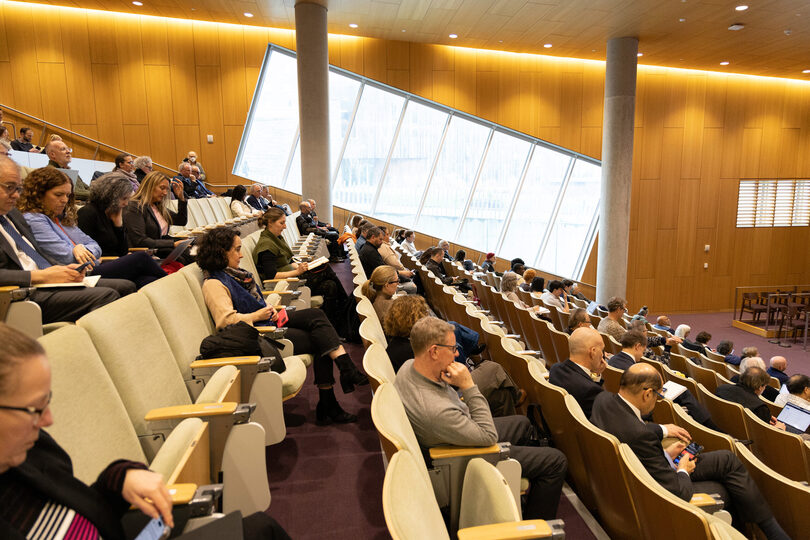SU plans ‘much stronger,’ earlier aid packages after spring’s late-cycle offers

"We're planning to go out with a much stronger discount rate off the bat." After making national news for offering families late-cycle financial aid packages, Syracuse University has different plans for this year. Solange Jain | Senior Staff Photographer
Get the latest Syracuse news delivered right to your inbox.
Subscribe to our newsletter here.
Earlier this year, Syracuse University made national news for offering families late-cycle financial aid packages. The university has different plans this year, said Ryan Williams, SU’s vice president for enrollment services.
“We’re planning to go out with a much stronger discount rate off the bat,” he said at Wednesday’s University Senate meeting. “We’re making sure that the families know that we’re putting forth an effort to understand where they are economically.”
Ahead of the previous admissions cycle, SU initially budgeted 38.6% of tuition dollars for financial aid, though it ended up at 45%, Williams said. Just about every school in the United States also “scrambled late in the cycle,” he added.
This year, the university’s discount rate will remain lower than peer institutions but “increase over historical percentages.” SU’s shift has moved the overall undergraduate discount rate to 40%, Williams said.
“We have been extremely fortunate to have a much lower discount rate than many of our peers for several years,” Williams said. “This past cycle gave us clear indication that the price sensitivity is pushing up our discount rate, and this is not likely to change anytime soon.”
Williams told the senate his team is working with university administrators to establish admissions “headcount targets” and a discount rate based on the headcounts. Consultation with deans, teaching capacity and infrastructure constraints will factor into those decisions.
SU is tentatively planning for an entering class of 3,750 students, Williams said. Last school year, the university received 47,178 applications to fill the same target — about 12.5 applications per open seat.
“These goals and targets are established now based on historical trends, and will be adjusted as needed in January when the application deadline passes and the pool is 95% formed,” Williams said.
Williams said the application landscape has “changed significantly” over the last six years and that the change is likely to continue. He cited factors including declining international enrollment, the questioning of the value of higher education and broader demographic trends affecting higher education as the cause.
Looking to the incoming SU class, nearly 13,000 prospective students have visited campus this semester, and admission staff have met with around 36,000 prospective students off-campus, he said.
Williams said SU’s early decisions will be released before Orange Appreciation Day, which is in late December, and regular decisions will be sent in early March.
Senators also received updates on SU’s accreditation process from Julie Hasenwinkel, SU’s associate provost for academic programs. The Middle States Commission on Higher Education, an institutional accreditor, gives SU students financial aid access and acts as a validator of degrees and credits.
The Middle States process spans three years and requires universities to submit evidence of compliance with seven standards. The university is currently within its self-study period, the second year of the overall process, which is scheduled to be submitted to Middle States next December, Hasenwinkel said.
A set of working groups, one for each Middle States standard and an additional one for general university compliance, will relay draft reports at the end of the semester.
“The self-study process gives us a structured opportunity to reflect on our institutional effectiveness and to demonstrate our commitment to continuous improvement,” Hasenwinkel said.
The self-study draft, built off the working group reports, will be finalized over the summer and made available to the SU community next fall, Hasenwinkel said. SU will host a Middle States university visit in spring 2027 and will receive the accreditation decision that summer.
Hasenwinkel said the Middle States process is mostly unchanged from previous years, besides increased evidence requirements.
Also at the meeting, Vice Chancellor and Provost Lois Agnew said she expects to receive portfolio review recommendations from each dean “by the end of the calendar year.” At the start of the semester, Agnew instructed each dean to begin an academic portfolio review of their school or college.
After Jan. 1, she plans to look over the recommendations and share them with the Academic Affairs Committee and then the broader campus community.
Chancellor Kent Syverud, who typically speaks for a few minutes at each senate meeting, missed Wednesday’s due to travel related to “university business.”
Other business
- Rick DiRubbo, a professor in the College of Engineering and Computer Science, said subcommittees within the Committee on Curriculum and Instruction focused on Idea courses, shared competencies and the current curriculum process have begun meeting. He said they have a “busy” next few months.
- Senators Margaret Susan Thompson and Lori Brown said the Academic Affairs Committee will continue to hold discussions on topics, including academic freedom, artificial intelligence, responses to federal executive orders and the dissolution of Graduate Student Organization. Thompson said the committee will present its annual faculty census spring 2026.





